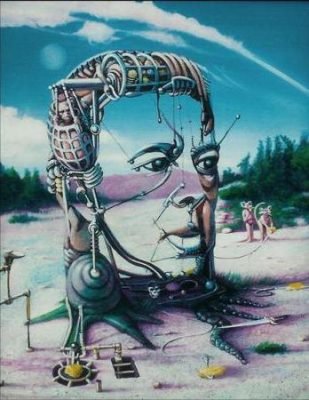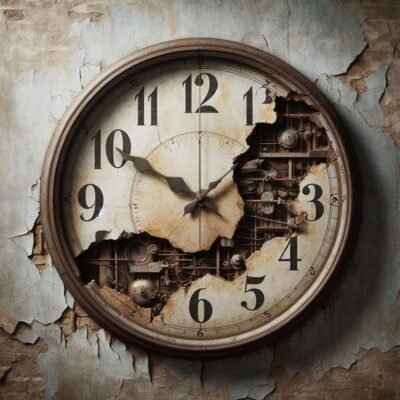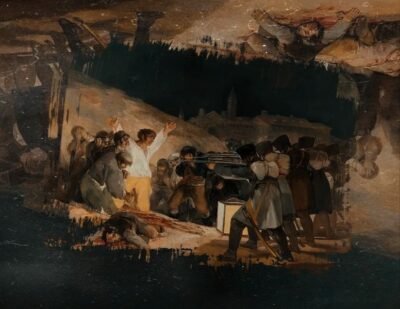A military helicopter has been circling high above our heads for several minutes now, like an angry insect in the midday heat. The pilot seems to be looking for something here between the fields and farm buildings. From the cover of a stand of trees, we have a clear view when the helicopter, a couple of hundred meters away, suddenly drops lower and fires four missiles. It then circles once more, tilted slightly to one side to allow the machinegun operator to fire into the tall fields of wheat, before the helicopter disappears into the milky haze of the horizon.
Thin clouds of smoke rise into the air. One field is on fire. Eleven rather dazed fighters from the Free Syrian Army (FSA) emerge from a house, onto the street in front of the building that now contains three smoking impact craters in a neat row. The fourth missile hit a solid stone wall that surrounds the property, but none struck the house itself, or the group’s vehicle, which is quite visibly parked next to the house. The group’s commander requests that the vehicle itself not be described in any further detail, since “it’s the only one we have.” These FSA fighters have been using the same vehicle for six months.
“The pilot must have seen it,” says Chal, the leader, who is an interior decorator by trade. “Why else would he have aimed here? But then, why aim to the side?”
Later this evening, some in the group will speak of God’s sheltering hand, but the military pilot likely had his own reasons for choosing not to kill the men, while at the same time sending a clear message: I know you’re in there. Ultimately, no one can know what went through that pilot’s mind on June 10, as he flew over the village of Harbal, near the northern Syrian city of Aleppo. What Chal’s men do know is that if the pilot had decided differently, they would now be dead. Now they drive off, veering from side to side.
Nightmare of Disintegration
It’s a strange moment in the nightmare of disintegration which Syria is currently experiencing. Fifteen grueling months into the revolution against the country’s dictatorship, an uprising that has become a war, it’s not possible to give a single, unified description of the situation here.
On the one hand, there’s an apocalypse in the form of the regime’s militias, murdering their way through the villages, flanked by government troops and “security” forces issuing orders. Reports published last week by the United Nations and Amnesty International depict torture, executions and the use of children as human shields.
Several doctors and nurses, interviewed separately by SPIEGEL at two military hospitals, reported cases of injured patients being murdered. They talked of corpses of torture victims in cold storage with their ears and noses cut off.
In the north of the country, villages within range of the weapons at Aleppo’s artillery school have been shelled indiscriminately since the beginning of June, as well as attacked by helicopters and fighter jets. In the days around June 10 alone, two dozen civilians died in the area north of Aleppo, and several soldiers and fighters from both sides died in combat.
But at the same time, there’s a pilot who aims off the mark. There are deserting soldiers that no one is trying to stop. Discreet warnings and agreements are made behind the scenes of these battles. Business owners in Aleppo pay both the regime and the rebels, and the FSA kidnaps officers and family members of the torture squads to exchange for prisoners. The regime’s terror tactics are causing its hold on power to crumble.
Looking to a Post-Assad Future
Everyone here is sure things are heading toward an end, but no one knows how it will play out. Here, in the plains around Maraa, in the villages and wheat fields between Aleppo and the Turkish border, the Syrian government ceased to exist months ago.
Occasionally, it does still send in erratic communications, as it did in late May, informing residents that buildings without construction permits would be made legal retroactively. But the rest of the time, what the government sends are bombs.
Yet even as inhabitants of the southern and western parts of the plain are fleeing out of range of the regime’s weapons, and as SPIEGEL experiences first hand in the town of Azaz how helicopters fire at random at people’s homes and the army’s snipers terrorize half the town from the minarets of the central mosque, at the same time just a few kilometers away in a village called Dabiq, representatives from nine towns are meeting to debate, for the first time in their lives, what the Syria of the future should look like.
Thirty-two men gather in an abandoned office that once belonged to the Baath Party that still nominally rules the country. There are several teachers, an engineer, two construction workers, a photographer, a former police officer, two deserted soldiers, an unemployed man and a couple of students. “What do we want?” is the question bandied about in different forms throughout the evening: An Islamic state? A republic? Or perhaps no government at all? After all, as one man points out: “At the moment, it’s easier without one than it was under the dictatorship.”
These men haven’t seen very much of the world themselves, but they’re familiar with the horror stories related by Iraqi refugees who fled their country’s civil war.
Some of the men were also guest workers in Lebanon and describe how the different religious camps there stand in each other’s way. All the people present agree that their country needs a civil constitution where people are not defined by religion or ethnic background, but by being citizens of Syria. They also agree that candidates for parliament should be selected on the basis of their abilities, not their religious background, and that no president should be allowed to serve longer than eight years.
“And people who hold office must disclose their own financial circumstances,” says the former police officer. “We have to make sure they stay honest.”
‘Too Much Blood on Their Hands’
But this delicate new beginning stalls when one person raises the question of whether the family of one Alawi teacher, who left here months ago, ought to return.
“Of course!” insist some. “She hasn’t done anything to anybody!” But the faces of some of the others harden. “They have too much blood on their hands,” they say.
Not the teacher herself, they say, but “the others.”
The men are unable to come to an agreement on this, or on another question that’s been a contentious issue for months throughout the country, from Daraa in the south to here in the north. “We’re very grateful to the FSA for protecting us,” one man says, attempting to put it diplomatically, “but we don’t want them to take over power!” One of the FSA members in the room, a defected soldier, is offended.
There’s a feeling of unease over the fighters’ growing power, explains Yassir al-Hajji, facilitator of this evening’s experiment, on the way back to Maraa. “We need them, absolutely, but we’re afraid of them.” Until the end of August last year, he explains, state security would turn up in town whenever they pleased and arrest people. Now, he says, not even the army comes to Maraa — the last time was April 10, when the regime’s forces burned down houses and shot up Hajji’s café with their machineguns before retreating half a day later, their tanks loaded down with carpets, mattresses and refrigerators. They left graffiti scrawled on the town’s walls, such as: “You don’t need freedom, instead your mothers need to be fucked again!” It was signed “S.M.F.” — Syrian Military Forces.
The Meaning of Free
Those are a few parting words, perhaps, from a government whose functions are slowly being taken over by Commander Chal, the interior decorator, and by other local FSA leaders. The “Committee for Social Services” which controls the price of diesel, the fire department, the municipal administration — all these are part of the new army whose name Hajji mocks: “Free Army — but what is that supposed to mean, ‘free’? Free to do whatever they like?”
It’s a fine line to walk, and hardly anywhere can this be seen more clearly than in the improvised prison operating out of a former administrative building in Maraa.
In particular, those who have tortured, killed or raped are brought here. They are people who have been — depending on your point of view — kidnapped or arrested after being identified by witnesses.
The man in charge here is a former sergeant who defected from the army, a giant of a man whose nickname is Janbu. After extensive negotiations, we are allowed to see two prisoners. One is a spy for the notorious shabiha militia, a philosophy student who reported on his fellow students for the regime’s
intelligence service. The other is a soldier accused of raping female prisoners and beating male prisoners with a club.
Earlier, Janbu has explained that they want to establish a justice system here, but concludes: “In the end, we can only release them or kill them.” Around 100 prisoners in seven months have been released, he says.
“And killed?” we ask.
“Only a few.”
“How many?”
“Very few.”
“Are the prisoners beaten?”
“No. Well, just falaka” — painful strikes against the soles of the feet with a stick.
“And electric shocks?” a Syrian who has also joined in this visit asks casually.
Janbu explodes. “No! We don’t do things like that! We’re not like them, we don’t use torture!”
“But what is falaka, if not torture?”
He’s quiet for a moment, then pulls himself together. “Do you know what they did to me? More than just falaka.” Janbu was held by the air force’s intelligence service for months, beaten and submitted to electric shocks, “until I couldn’t control my piss anymore,” he says. He owes his freedom to a captured Alawi colonel, whose release was granted in exchange for his own.
Ordered to Rape
A slim man is led into the room. He’s 21 and from Hasaka in northeastern Syria. He says his name and then that he was present when the army attacked the cities of Jisr al-Shughour and Idlib last summer. He knows what happened there, and begins to tell his story.
It’s impossible for a journalist to determine conclusively whether the man is telling the truth, or if he simply wants to save his own skin by offering a confession. Still, the information he gives suggests that what he describes is true. When asked, he proves to be familiar with tactical specifics of the attacks, and he can describe in detail the interior of the sugar factory in Idlib, which the army used as its torture center. Hundreds of people entered that building alive last year who have since disappeared.
No one interrupts as the man gives his statement, an hours-long account that goes into the smallest details. Ultimately, his story fits with testimony given by other witnesses.
“The colonel from the military intelligence service selected me and 14 others for the operation as a ‘reward,’ but it was an order,” he says.
“And what did the operation turn out to be?”
“An order to rape women that they brought in. The first time it was three of them, and they’d already been drugged. The security men undressed them, and they raped them first. Then it was our turn, in two shifts, and the men from security watched. They said they would shoot us if we didn’t do it.”
How was he able to have sexual intercourse under such circumstances?
“The first time it was difficult, but after that it was easier.” The women were young, he says, and chosen specifically because they hadn’t been arrested together with other relatives who might have asked after them.
“And then?”
“They were taken away.”
“Where were they taken?”
“Away.”
‘We Beat Them Until the End’
He says he took part in this 11 times. “At first they chose the women from the prisoners, then they took some with them from checkpoints.”
“And the men?”
“Twenty of them at a time were brought into a room, and there were 150 of us with clubs. The colonel said anybody that there was a file on, he wanted to have alive. The others, we should beat until the end.”
“And then?”
“Yes.”
“What happened then?”
“We beat them until the end. Until they were dead.”
A court will pass judgment on the man, his guards say. They cite religious law: “Man katal, yuktal,” meaning, “whoever has killed will be killed.” They don’t understand why this should be considered any less humane than killing in combat.
Still, the matter isn’t quite that simple. If it were, they would have shot this man long ago. But they too have felt the reactions the other side’s violence provokes in them.
Body Parts on the Road
“We must not take killing lightly,” Yassir says, then explains why a nearby village continues to tolerate a family whose three sons hired themselves out as mercenaries for the shabiha: “We hoped they would just stop.”
That turned out to be a tragic mistake. One Thursday, the three brothers planned to take the minibus to Aleppo, where they would help crack down on the Friday demonstrations that continued to take place peacefully in the city. It’s just one example of the madness of this war that the three mercenaries, traveling fully armed through the rebels’ territory, wanted to save money by taking the bus.
An FSA sentry asked to see their identification. An argument broke out and two of the shabiha men drew pistols, but the Free Syrian Army was faster, and killed them.
The third man tried to throw a hand grenade into the minibus, which was halfway full of passengers, but a man standing next to him attempted to hold him back. The mercenary shoved the grenade down the open front of the man’s shirt instead, pulled out the pin and jumped aside at the last moment, as the explosion tore apart the body of the man, an uninvolved bystander. It later took an entire bucket of sand to cover the bits of his body they didn’t take away to bury.
Yet those who removed the body were in a hurry and overlooked so many pieces that another man picked up an empty Kleenex box and began to collect the rest, now scattered across the intersection: splinters of bone, viscera, a bit of brain that he carefully wiped up from the asphalt with a tissue. Someone else promised to bring the box, now full, to the cemetery. As they set off, an old man, who had also helped silently to search for the pieces, still stood there holding a piece of skull, not sure what to do with it.
Everyone else was in a hurry to leave, driving away as the sound of gunfire once again sounded somewhere in the distance, and the old man was left
standing in the middle of the intersection, gazing silently after the others, a piece of skull held in his raised hand as if in greeting.
Christoph Reuter: Escalating ViolenceFace to Face with Syria’s Apocalypse
Translated from the German by Ella Ornstein






المزيد من المواضيع
تحول تاريخي: الاعتراف الرسمي بحقوق الكرد السوريين وإعادة تعريف الشراكة الوطنية
حين يصبح السلاح عبئاً على الأكراد… حلّ قسد لم يعد خياراً
هل تُهدّد الترتيبات الأمنية مكانة الجولان كأرض سورية محتلة؟